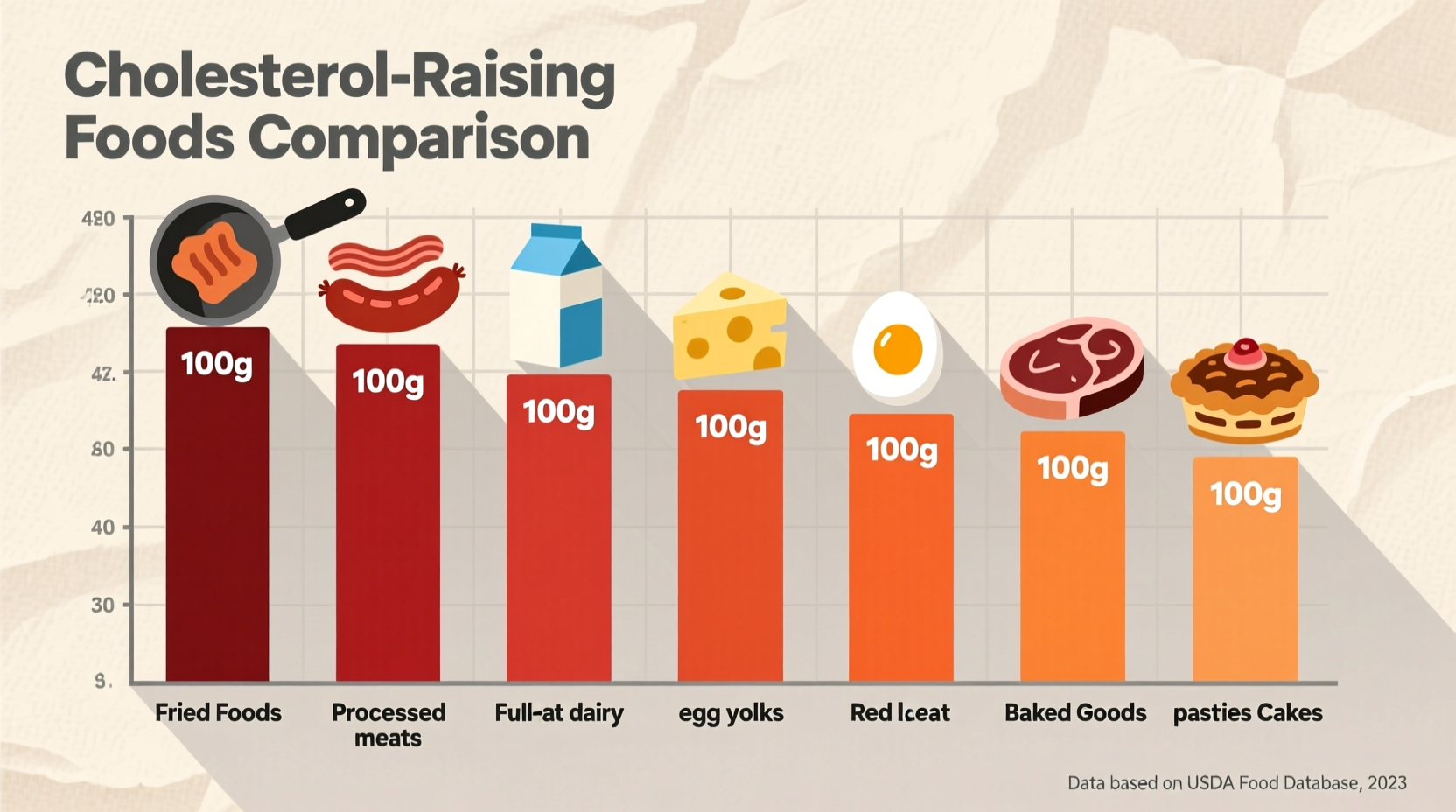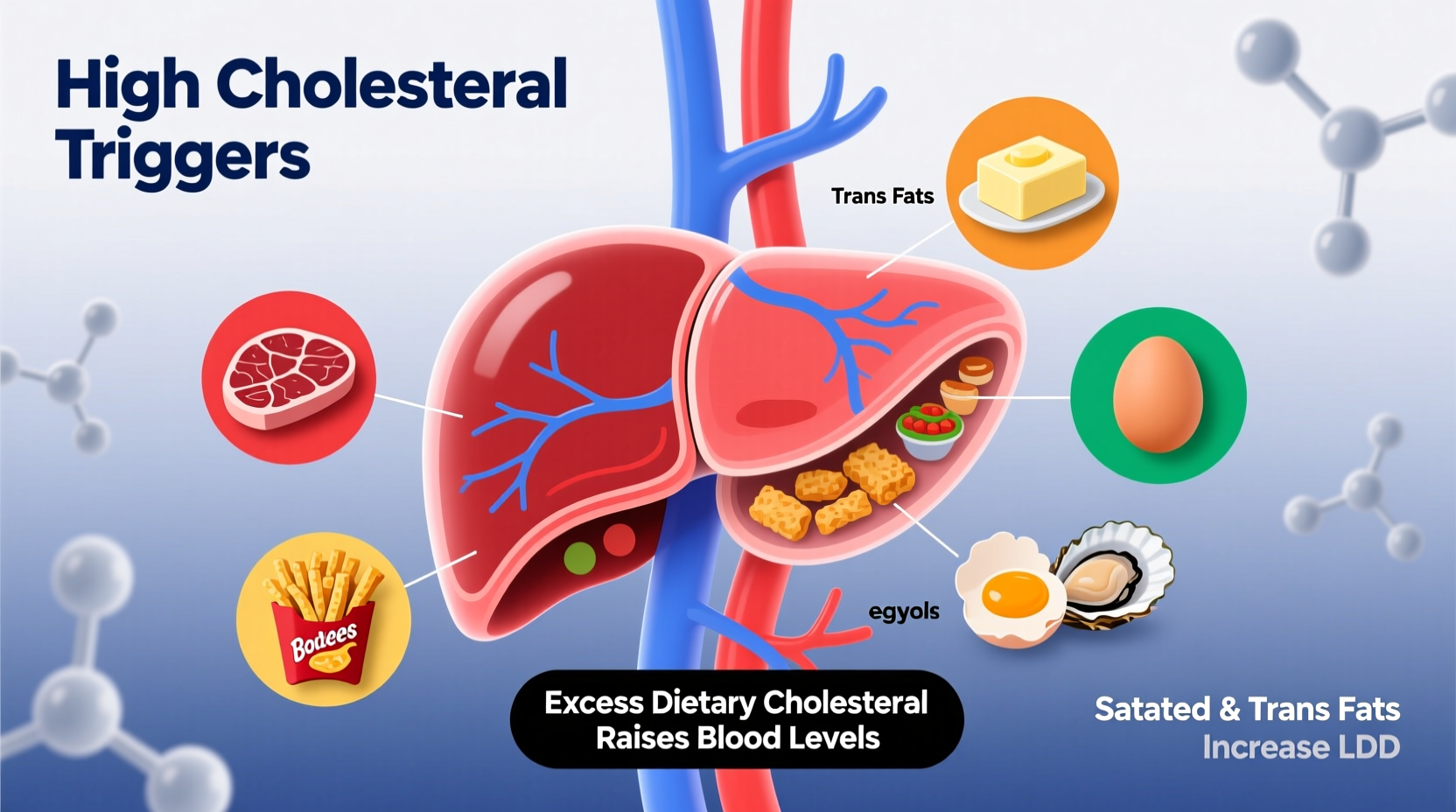The primary foods that cause high cholesterol are those rich in saturated fats and trans fats—not dietary cholesterol itself. Processed meats, fried foods, baked goods with hydrogenated oils, and full-fat dairy products significantly raise LDL ("bad") cholesterol levels. Current research shows saturated fats have 3-5x more impact on blood cholesterol than dietary cholesterol from eggs or shellfish.
Understanding which foods actually affect your cholesterol levels can feel confusing. You've likely heard conflicting advice about eggs, butter, and other common foods. The truth is more nuanced than simple "good vs bad" lists. Let's cut through the confusion with science-backed information you can trust.
Why Most People Get Cholesterol Wrong
For decades, we've been told to avoid dietary cholesterol—found in eggs, shellfish, and organ meats. But recent research reveals a different story. The American Heart Association now emphasizes that saturated and trans fats have a far greater impact on blood cholesterol levels than dietary cholesterol itself.
Here's the crucial distinction:
| Factor | Impact on LDL Cholesterol | Primary Food Sources |
|---|---|---|
| Saturated fats | High (3-5x greater impact) | Fatty meats, butter, coconut oil, palm oil |
| Trans fats | Very high (worst impact) | Processed snacks, fried foods, margarine |
| Dietary cholesterol | Low (minimal impact for most people) | Eggs, shellfish, liver |
The Real Culprits: Saturated and Trans Fats
When researchers at the National Heart, Lung, and Blood Institute analyzed decades of data, they found saturated fats increase LDL cholesterol by promoting liver production of cholesterol. Trans fats are even worse—they simultaneously raise LDL while lowering HDL ("good") cholesterol.
Top Saturated Fat Sources to Limit
- Processed meats: Bacon, sausages, hot dogs (often contain 4-8g saturated fat per serving)
- Fatty cuts of red meat: Ribeye steak, ground beef (80% lean)
- Full-fat dairy: Butter, cream, whole milk, cheese (especially hard cheeses)
- Tropical oils: Coconut oil, palm oil (common in packaged foods)
Hidden Trans Fat Danger Zones
Though banned in many countries, partially hydrogenated oils still appear in some products. Check labels for:
- Commercial baked goods (pies, cakes, cookies)
- Fried foods (especially from fast food restaurants)
- Non-dairy creamers
- Ready-to-use frosting

The Evolution of Cholesterol Science
Understanding how dietary recommendations have changed helps explain current confusion. This timeline shows key shifts in scientific understanding:
| Time Period | Dietary Guidance | Current Understanding |
|---|---|---|
| 1960s-1990s | Avoid all dietary cholesterol (max 300mg/day) | Outdated - dietary cholesterol has minimal impact for most |
| 2000s | Focus on reducing total fat | Over-simplified - fat type matters more than total amount |
| 2010s-present | Target saturated and trans fats specifically | Current standard - focus on replacing bad fats with good ones |
Practical Swaps for Heart-Healthy Eating
Instead of focusing on single "bad" foods, consider these evidence-based dietary patterns:
Smart Substitutions
- Instead of butter: Use olive oil or avocado oil (monounsaturated fats lower LDL)
- Instead of fried foods: Bake, grill, or air-fry with minimal oil
- Instead of processed meats: Choose lean poultry or plant-based proteins
- Instead of whole milk: Use unsweetened almond or soy milk
Heart-Healthy Eating Patterns
The Dietary Guidelines for Americans recommend these proven approaches:
- Mediterranean diet: Rich in fruits, vegetables, whole grains, and healthy fats
- DASH diet: Specifically designed to lower blood pressure and cholesterol
- Plant-forward approach: At least 50% of your plate with plant-based foods
Important Context: Individual Variability Matters
While these guidelines apply to most people, individual responses vary. Approximately 15-25% of the population are "hyper-responders" who experience greater cholesterol changes from dietary cholesterol. If you have:
- Family history of heart disease
- Diabetes
- Existing high cholesterol
Work with a healthcare provider to determine your personal dietary needs. Genetic factors like the APOE4 variant can significantly influence how your body processes dietary fats.
Your Action Plan for Managing Cholesterol Through Diet
Based on current evidence, here's what actually works:
- Read labels carefully: Look for "0g trans fat" and limit foods with more than 3g saturated fat per serving
- Cook more at home: You control the ingredients and cooking methods
- Choose lean proteins: Fish, skinless poultry, beans, and lentils
- Embrace healthy fats: Avocados, nuts, seeds, and olive oil
- Eat more fiber: Aim for 25-30g daily from whole grains, fruits, and vegetables
Remember that small, sustainable changes matter more than perfection. Replacing just 5% of saturated fats with unsaturated fats can lower heart disease risk by up to 10%, according to research published in Circulation.











 浙公网安备
33010002000092号
浙公网安备
33010002000092号 浙B2-20120091-4
浙B2-20120091-4